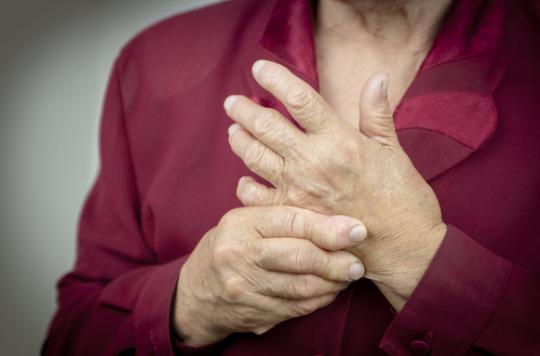Satisfied but silent. Patients with rheumatoid arthritis do not complain about their follow-up. But they often hide their fears from their doctor.

A true dialogue of the deaf … 250,000 people live with rheumatoid arthritis in France. This chronic disease requires long-term follow-up, with several stakeholders. But only 17% of patients believe they have benefited from so-called comprehensive care. This is shown by a Harris Poll (1) survey presented at the congress of the French Society of Rheumatology, which is held at the Palais des Congrès at Porte Maillot (Paris). An opinion that is not shared by health professionals: half of rheumatologists believe they have offered an adapted and multidisciplinary follow-up.
Different expectations
The gap is not thin between patients and their caregivers. It is more like a ditch. In addition to the care, patients do not have the same feeling about the impact of rheumatoid arthritis on the mind. “We notice it regularly,” confirms Sandrine Rollot, deputy director of the Association française des polyarthritiques (AFPric). In a survey, 55% of patients believe that this is not taken into account while 95% of rheumatologists say they are concerned. The problem has several sources, starting with the priorities of these two players.
The EPOC study, presented at the congress of the European League against Rheumatism (EULAR) last July, clearly demonstrates the gap that can be created. Patients prioritize their quality of life, even if it means skipping treatment. Doctors do not necessarily share this point of view. “The main concern of the doctor is the control of the disease, illustrates Cyrielle Belle, communication officer at AFPric. The patient cares more about his well-being on a daily basis. The taking into account of undesirable effects may therefore vary depending on the provider.
Laure Gossec, rheumatologist at the Pitié-Salpêtrière hospital (Paris): ” There is often a mismatch between the expectations of patients and physicians. We do not all have the same definition of comprehensive care. “
Speak the same language
If the dialogue goes badly, it is also because patients tend to remain silent. This survey confirms it: 77% of them are uncomfortable at the idea of discussing their concerns with their doctor. In four out of ten cases, it is because they fear they may come across as difficult patients. And this even though professionals and patients alike agree that communication is correct. “We are trying to verify that we speak the same language,” emphasizes Laure Gossec, rheumatologist at the Pitié-Salpêtrière hospital. We are also trying to better understand what patients expect. Moreover, 70% of specialists are ready to lend a more attentive ear to their patients.
Laure Gossec : ” It is the unsaid of the consultation. This can be seen peripherally, by non-adherence to the treatment, for example. “
The solution could come from therapeutic education. Since 2007, the Haute Autorité de Santé has recognized its interest in monitoring rheumatoid arthritis. This device is supposed to help patients understand the keys to their disease, manage the symptoms including by modifying their lifestyle. “It’s very useful,” recognizes Laure Gossec, who points to two major problems. “It is not offered everywhere and TVE is often separated from care. “
Sandrine Rollot, Deputy director of AFPric: “When there are sessions, they are not always offered to all patients. Sometimes the hospital is far away… ”
The system is not perfect. But it has the merit of existing, and of developing. Pierre and Marie Curie University in Paris recently created the patients’ university. Directed by Catherine Tourette-Turgis, specialized in therapeutic education, it trains expert patients. “I have trained several people with rheumatoid arthritis. When they are trained, they better understand the psychology of caregivers, ”she explains. PR is an example in this area. We must now learn the lessons and extend the system to other chronic diseases. Because dialogue is lacking in other areas.

(1) Harris Poll survey for the Pfizer laboratory (RA NarRAtive survey), conducted on the Internet among more than 1,700 rheumatologists and 3,900 people with rheumatoid arthritis in 15 countries, including France.
.















